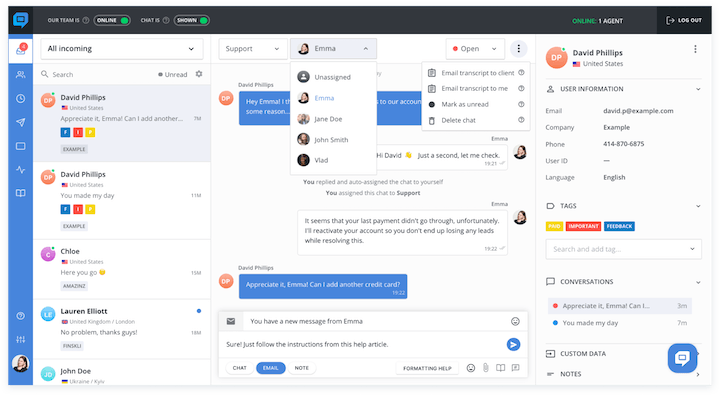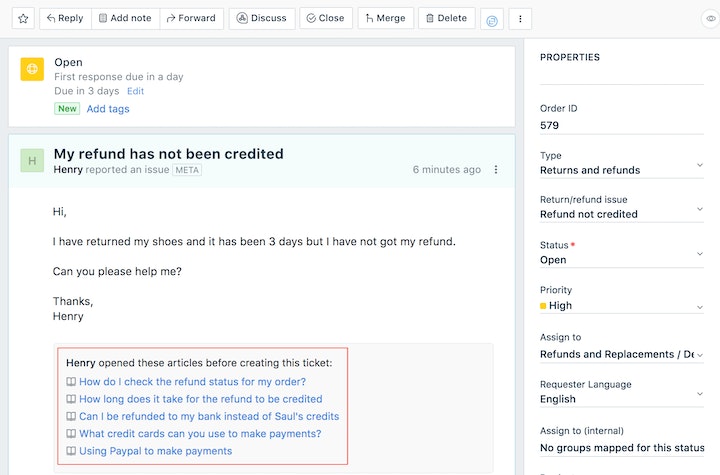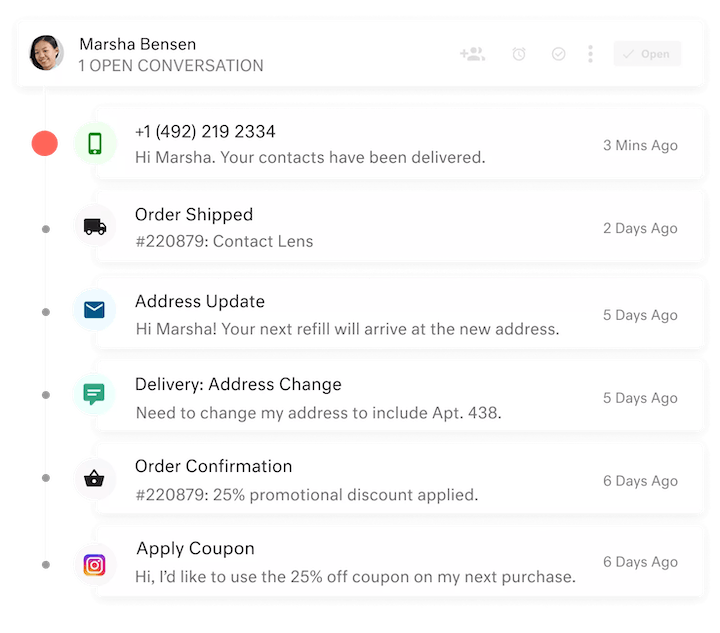The 7 Best Crisp Alternatives for Customer Support in 2023


Most software tends to take one of two approaches: They either go wide, or they go deep.
Going wide is when a company tries its best to cover as many use cases as possible. Going deep is basically the opposite — instead of trying to cover lots of use cases, they focus on covering one or two thoroughly.
Neither approach is inherently better than the other; they’re just different. One look at Crisp’s homepage, and it’s clear they are taking the wide route. If you need basic functionality in the different areas they cover, Crisp could be a great option.
However, if you’re looking for a tool specifically geared toward customer support, Crisp may not be the best option. The truth of the matter is that creating top-notch customer support software is a difficult task, and isn’t something that can be accomplished with a split focus.
The 7 best Crisp alternatives for customer support
If you’re looking into using Crisp for customer support or if you’re already a Crisp user and you’re looking for something else, we’ve put together a list of alternatives to consider:
Help Scout
Drift
HelpCrunch
Zendesk
Freshdesk
Chatwoot
Kustomer
Each of the tools below is more focused on customer support and may be better suited for that application than Crisp.
1. Help Scout
Best for growing teams focused on customer service.
Help Scout is a dedicated customer support platform built for growing teams to deliver best-in-class customer service. When you sign up you get access to an entire suite of tools, all optimized specifically for customer support.
Help Scout's shared inbox includes features like private notes and @mentions to improve team collaboration, and collision detection helps reduce duplicate work by showing when an agent is actively working on a specific conversation.
You can even automate routine tasks like conversation sorting with workflows and get additional context with customer profiles.
If you’re looking to create a powerful self-service resource, Docs is right up your alley. The intuitive editor makes creating help center content a breeze, and built-in search functionality and organization features ensure customers can find the content they need.
Lastly, Docs-specific reports show which content is doing best and the most helpful areas for you to expand.
You also get access to Beacon, which offers live chat capabilities and proactive support options through an embeddable widget. Customers can search help documentation or submit a question to your support team right from the widget, helping them get answers when and where they need them most.
Help Scout also comes loaded with pre-built performance dashboards. Reports help you better understand individual and team performance, and you can create custom views to have a snapshot of the metrics most important to you.
Last, but certainly not least, you get access to Help Scout’s world-class support team who are available by email 24/6 to answer any questions you may have.
Price: Starting at $20/agent per month.
2. Drift
Best for sales-focused teams.
Many people primarily think of Drift as a sales and marketing tool. Though most of their messaging is geared toward those uses, there are some customer support applications as well, like their chat functionality.
On the surface it may seem like a standard chat tool, but Drift’s technology automatically detects previous site visitors and helps personalize messaging to have more impact and create a better overall customer experience.
We should note Drift doesn’t include any other customer support-focused tools, which could be a negative depending on your specific use case.
Price: Contact for pricing.
3. HelpCrunch
Best for teams primarily using live chat.

HelpCrunch is a customer communication tool that includes a help desk, a live chat widget, pop-up messaging capabilities, a knowledge base builder, and email marketing software.
There are also features specifically geared toward customer support, like internal notes and saved responses to answer common questions quickly.
The place where HelpCrunch really shines is live chat. You’re able to embed the chat widget on a webpage or even in-app (though that option does require some custom coding). There are also no-code customization options, along with the ability to add your own custom CSS.
Price: Starting at $12/agent per month.
4. Zendesk
Best for large teams with big budgets.

Almost anyone working in support has heard of Zendesk. They’re the biggest name in the space and have an extensive feature list, including a shared inbox, live chat, knowledge base capabilities, and proactive messaging.
They also include features for phone support and even chatbot and AI-powered automated responses — though those more advanced features are limited to their higher-cost plans. If you need all those features, Zendesk is a great tool. If you don’t, there’s probably another option that’s more cost effective and simpler to set up.
Price: Starting at $49/agent per month.
5. Freshdesk
Best for phone-centric teams.

Similar to other offerings on our list, Freshdesk is a customer service platform including a number of different tools like a shared inbox, a live chat tool, and a knowledge base builder. They also include some standard features like internal notes and workflow automations to improve productivity.
Where Freshdesk really shines, in our opinion, is on the phone front. They have a number of different tools and features specifically built to make phone interactions run smoothly.
We should note, in order to get access to those features you do need to subscribe to their omnichannel plan, which is a little pricier than some other options on our list.
Price: Free plan available. The features mentioned above are available on their omnichannel plans, which start at $29/agent per month.
6. Chatwoot
Best for highly technical teams.
Chatwoot is an open-source customer communication platform. They offer a number of core customer support features including a shared inbox, live chat, chatbots, and the ability to connect to a number of different channels.
To be candid, their shared inbox is a little light on features, and it appears that their chat feature is the most robust in their offering. That said, since they’re an open-source company, you get complete access to their codebase. So, if you have a lot of technical know-how at your disposal, you have a lot of customization options.
Price: Free plan available. Paid plans starting at $19/agent per month.
7. Kustomer
Best for teams wanting CRM capabilities.

Similar to Crisp, Kustomer includes some common customer communication tools as well as CRM capabilities. Their main claim to fame is their AI product called Kustomer IQ. It helps sort conversations and can even respond to basic requests automatically.
Though some of those features are impressive, it does come at a decently steep price. Unless you’re particularly interested in the idea of AI helping with customer support, there are other tools that can accomplish similar results using automated workflows for less money.
Price: Starting at $89/user per month.
Making a decision
Crisp does a lot of different things, but for some folks, it ends up being a jack-of-all-trades and master of none. Though there is certainly value in that, if you’re looking to dive deep on one specific use case — like customer support — there’s probably a tool better suited for you and your team.
Investing in a new tool, whether for the first time or because you need an upgrade, is a big decision. Be sure you take the time upfront to understand your needs and goals, and let those be the driving forces behind your decision.







